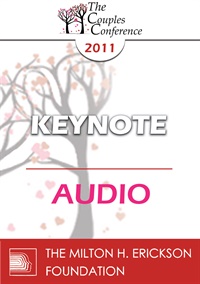
- Average Rating:
- Not yet rated
- Topic Areas:
- Keynotes | Couples Therapy | Dreamwork | Gottman Method | Conflict
- Categories:
- Couples Conference | Couples Conference 2011
- Faculty:
- Julie Gottman, PhD
- Duration:
- 39:44
- Format:
- Audio Only
- Original Program Date:
- Apr 03, 2011
- Short Description:
- Gridlocked perpetual conflicts often destroy relationships. They repeatedly surface, causing partners endless pain, fear, even trauma. Yet every couple faces them. In this address, Dr. Julie Gottman describes a dyadic therapy method that uncloaks the dreams, history and fears beneath partners’ issues while fostering greater compassion and connection in the couple. An edited film will be shown to demonstrate this intervention.
- Price:
- $15.00 - Base Price
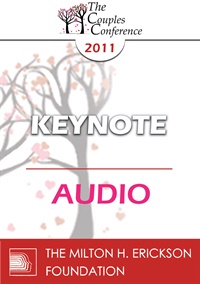
- Average Rating:
- Not yet rated
- Topic Areas:
- Family Therapy | Keynotes | Intimacy | Family Systems | Communication | Couples Therapy
- Categories:
- Couples Conference | Couples Conference 2011
- Faculty:
- Richard Schwartz, PhD
- Duration:
- 56:30
- Format:
- Audio Only
- Original Program Date:
- Apr 03, 2011
- Short Description:
- We have all been taught that our romantic partner should end our misery and make us feel happy and alive. When he or she doesn’t we wonder if they’re the right one. Yet, for most of us, no partner is capable of keeping our heads above the pools of pain and shame we bring to intimate relationships. Only we can drain those pools and become the primary caretakers for the young, needy parts of us that are drowning in those pools. Once this inner trust is achieved, we can love our partners courageously and unconditionally because we don’t need them to always do the heavy lifting of our spirits.
- Price:
- $15.00 - Base Price
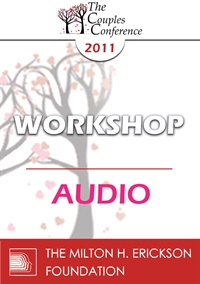
- Average Rating:
- Not yet rated
- Topic Areas:
- Divorce | Workshops | Couples Therapy | Marriage
- Categories:
- Couples Conference | Couples Conference 2011 | Pioneers in Couples and Family Therapy
- Faculty:
- William Doherty, PhD
- Duration:
- 1:55:54
- Format:
- Audio Only
- Original Program Date:
- Apr 03, 2011
- Short Description:
- This workshop will help you examine how your values and life experience affect your treatment of couples on the brink of divorce, and will teach you a protocol for helping clients make a decision that has integrity for all involved and that improves the odds that couples will try to heal their broken bond.
- Price:
- $15.00 - Base Price
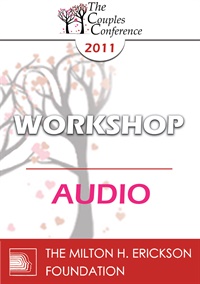
- Average Rating:
- Not yet rated
- Topic Areas:
- Workshops | Couples Therapy | Psychobiological Approach to Couples Therapy (PACT) | Neurobiology
- Categories:
- Couples Conference | Couples Conference 2011 | Pioneers in Couples and Family Therapy
- Faculty:
- Stan Tatkin, PsyD, MFT
- Duration:
- 1:56:30
- Format:
- Audio Only
- Original Program Date:
- Apr 03, 2011
- Short Description:
- This workshop presents a psychobiological approach to couples therapy, focusing on nonverbal communication, attachment styles, and arousal regulation. Techniques include frame-by-frame video analysis, movement-based assessments, and real-time biofeedback. Practical tools like camera setup, rolling chairs, and video playback are used to enhance therapist attunement, mutual regulation, and client insight—while underscoring ethical tech use and client privacy.
- Price:
- $15.00 - Base Price
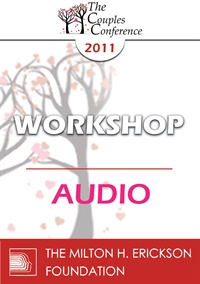
- Average Rating:
- Not yet rated
- Topic Areas:
- Couples Therapy | Workshops | Psychobiological Approach to Couples Therapy (PACT) | Neurobiology
- Categories:
- Couples Conference | Couples Conference 2011 | Pioneers in Couples and Family Therapy
- Faculty:
- Stan Tatkin, PsyD, MFT
- Duration:
- 2:05:40
- Format:
- Audio Only
- Original Program Date:
- Apr 03, 2011
- Short Description:
- This workshop explains and proves the meaning of the title, that romantic partners mostly do not know what they are doing or why. Tatkin explores a psychobiological approach to couples therapy, emphasizing attachment styles, neurobiology, and nonverbal communication. Topics include stress regulation via the amygdala and vagus nerve, the role of the right hemisphere in emotional processing, and techniques like voice modulation and play. Case examples illustrate how brief, affect-driven interventions help partners co-regulate, manage conflict, and improve relational dynamics.
- Price:
- $15.00 - Base Price
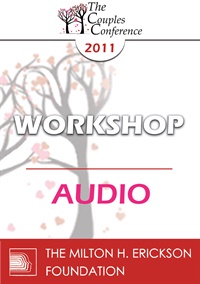
- Average Rating:
- Not yet rated
- Topic Areas:
- Workshops | Couples Therapy | Family Systems
- Categories:
- Couples Conference | Couples Conference 2011
- Faculty:
- Richard Schwartz, PhD
- Duration:
- 1:55:14
- Format:
- Audio Only
- Original Program Date:
- Apr 03, 2011
- Short Description:
- Internal Family Systems therapy synthesizes two paradigms: systems thinking and the multiplicity of the mind—and brings concepts and methods from many schools of family therapy to the world of sub-personalities. In addition to learning how to help clients access their Self, participants will learn the dif-ferent kinds of parts they will encounter in clients (managers, firefighters, and exiles) and how to help those parts transform. The workshop will provide tools to help therapists stay centered and open-hearted, as well as provide a user-friendly language for therapy that encourages disclosure and empathy.
- Price:
- $15.00 - Base Price
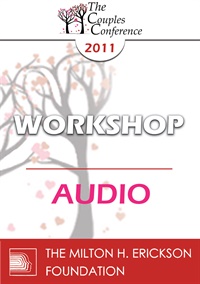
- Average Rating:
- Not yet rated
- Topic Areas:
- Couples Therapy | Workshops | Experiential Therapy | Attunement | Therapist Development
- Categories:
- Couples Conference | Couples Conference 2011
- Faculty:
- Jeffrey Zeig, PhD | Lilian Borges, MA, LPC
- Duration:
- 1:51:14
- Format:
- Audio Only
- Original Program Date:
- Apr 03, 2011
- Short Description:
- People change due to the experiences they live, more than the information they receive. A brief overview of the experiential approach will be followed by a demonstration and discussion of the experiential methods used for assessment and treatment, which include couples and therapist sculpting, attunement, and the use of signals.
- Price:
- $15.00 - Base Price
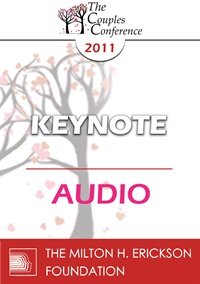
- Average Rating:
- Not yet rated
- Topic Areas:
- Couples Therapy | Keynotes | Therapist Development | Cultural and Social Contexts
- Categories:
- Couples Conference | Couples Conference 2011 | Pioneers in Couples and Family Therapy
- Faculty:
- William Doherty, PhD
- Duration:
- 59:52
- Format:
- Audio Only
- Original Program Date:
- Apr 02, 2011
- Short Description:
- A renowned marriage therapist addresses common pitfalls in couples therapy, highlighting the importance of structured sessions, managing conflict, and empathizing equally with both partners. Practical insights include handling pivotal moments, such as reconciliation attempts, framing therapy as a trial period, and addressing gaps in therapist training.
- Price:
- $15.00 - Base Price
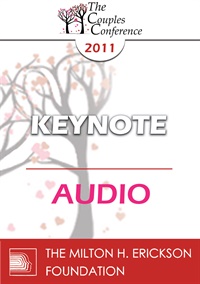
- Average Rating:
- Not yet rated
- Topic Areas:
- Infidelity | Keynotes | Affairs | Couples Therapy | Marriage | Relationships
- Categories:
- Couples Conference | Couples Conference 2011
- Faculty:
- Esther Perel, MA, LMFT
- Duration:
- 59:11
- Format:
- Audio Only
- Original Program Date:
- Apr 02, 2011
- Short Description:
- There are multiple reasons for affairs. We will examine the benefits of affairs and why affairs can actually stabilize a marriage. In particular, we will focus on how couples can turn the crisis into an opportunity. This is a multicultural therapeutic approach for working with extramarital relations.
- Price:
- $15.00 - Base Price
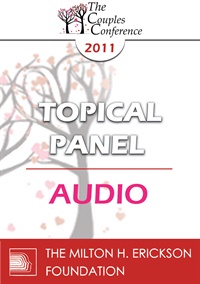
- Average Rating:
- Not yet rated
- Topic Areas:
- Topical Panels | Internal Family Systems (IFS) | Psychotherapy
- Categories:
- Couples Conference | Couples Conference 2011 | Pioneers in Couples and Family Therapy
- Faculty:
- Jeffrey Zeig, PhD | Richard Schwartz, PhD | Stan Tatkin, PsyD, MFT
- Duration:
- 1:05:16
- Format:
- Audio Only
- Original Program Date:
- Apr 02, 2011
- Short Description:
- This panel explores the Internal Family Systems (IFS) model, focusing on the idea of "parts" as subpersonalities that shape how individuals cope and relate. Speakers examine the roles of protectors and exiles, and how mindful, regulated states can foster change. They compare similar concepts from other models, including transactional analysis and object relations, and discuss tools like enactments and hypnosis to help clients access and work with their parts.
- Price:
- $15.00 - Base Price
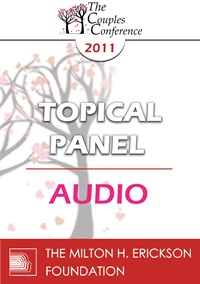
- Average Rating:
- Not yet rated
- Topic Areas:
- Divorce | Couples Therapy | Topical Panels | Assessment
- Categories:
- Couples Conference | Couples Conference 2011 | Pioneers in Couples and Family Therapy
- Faculty:
- Lilian Borges, MA, LPC | William Doherty, PhD | Julie Gottman, PhD
- Duration:
- 59:04
- Format:
- Audio Only
- Original Program Date:
- Apr 02, 2011
- Short Description:
- A panel discussion on effectively assessing when separation or divorce may be appropriate for couples. Experts share practical methods, including structured assessment sessions using conflict discussions and physiological responses, as well as discernment counseling to clarify couples’ decisions. They emphasize key factors such as trust, emotional intimacy, conflict management, and therapist neutrality. Real-world examples highlight handling severe issues like addiction and domestic violence, and maintaining hope while supporting clients' difficult decisions.
- Price:
- $15.00 - Base Price
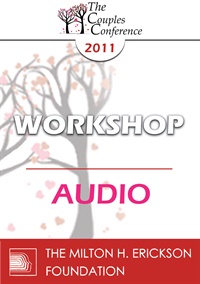
- Average Rating:
- Not yet rated
- Topic Areas:
- Workshops | Conflict | Couples Therapy | Pain and Healing | Relationships
- Categories:
- Couples Conference | Couples Conference 2011
- Faculty:
- Julie Gottman, PhD
- Duration:
- 1:38:30
- Format:
- Audio Only
- Original Program Date:
- Apr 02, 2011
- Short Description:
- Couples’ conflicts that hurt and go unprocessed often lead to chasms of emotional distance. This workshop explains and demonstrates with film how a couple can learn to process their own battles and move from resentment to understanding, accountability, and repair. The Gottman “Recovery Kit” will be explained and given to each participant.
- Price:
- $15.00 - Base Price
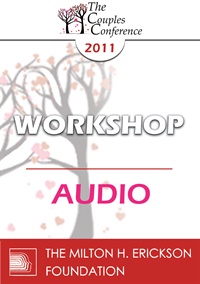
- Average Rating:
- Not yet rated
- Topic Areas:
- Workshops | Couples Therapy | Blended Families | Parenting
- Categories:
- Couples Conference | Couples Conference 2011 | Pioneers in Couples and Family Therapy
- Faculty:
- William Doherty, PhD
- Duration:
- 1:56:46
- Format:
- Audio Only
- Original Program Date:
- Apr 02, 2011
- Short Description:
- Remarried couples are often poorly served by therapists who treat them without enough appreciation for the unique complexity and multiple loyalties of stepfamily life. This workshop will combine clinical assessment and treatment issues with a special focus on values issues such as commitment and fairness that often dominate conflict in stepfamilies.
- Price:
- $15.00 - Base Price
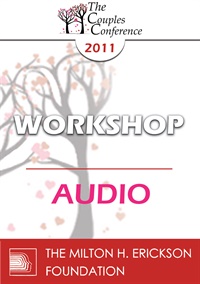
- Average Rating:
- Not yet rated
- Topic Areas:
- Sex and Sexuality | Workshops | Couples Therapy
- Categories:
- Couples Conference | Couples Conference 2011
- Faculty:
- Marty Klein, PhD
- Duration:
- 2:03:09
- Format:
- Audio Only
- Original Program Date:
- Apr 02, 2011
- Short Description:
- How do we raise sexual issues? How should we respond when the couple does? Why doesn’t THIS couple enjoy sex, or have sex? Are aging or health issues complicating sexual problems? What’s the ONE cross-cultural issue that matters regarding sexuality? And what’s really a sexual issue—versus an issue of power, grief, resentment, or fear of rejection/abandonment? This PRACTICAL workshop will give you skills you can use on Monday morning.
- Price:
- $15.00 - Base Price
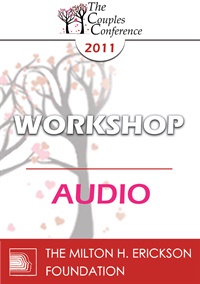
- Average Rating:
- Not yet rated
- Topic Areas:
- Workshops | Anger | Couples Therapy
- Categories:
- Couples Conference | Couples Conference 2011 | Pioneers in Couples and Family Therapy
- Faculty:
- Ellyn Bader, PhD
- Duration:
- 1:09:17
- Format:
- Audio Only
- Original Program Date:
- Apr 02, 2011
- Short Description:
- Explore couples therapy techniques for addressing hostile, angry partners. Learn specialized strategies for managing conflict, processing emotional trauma, and helping couples develop effective communication skills. Includes practical interventions like the Twilight Zone exercise and rapid repair technique, with insights into relationship dynamics and therapeutic approaches.
- Price:
- $15.00 - Base Price
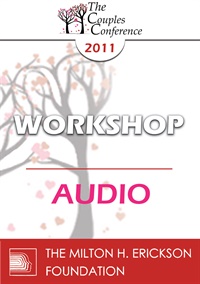
- Average Rating:
- Not yet rated
- Topic Areas:
- Sex and Sexuality | Workshops | Intimacy | Couples Therapy
- Categories:
- Couples Conference | Couples Conference 2011
- Faculty:
- Esther Perel, MA, LMFT
- Duration:
- 1:26:34
- Format:
- Audio Only
- Original Program Date:
- Apr 02, 2011
- Short Description:
- This workshop probes the intricacies of love and desire—how they relate and how they conflict.. Participants will learn how emotional intimacy can inhibit sexual desire and why “good intimacy” doesn’t necessarily make for “good sex.” Through case material and video vignettes, we’ll explore how our emotional history: “how we were loved” shapes our erotic blueprints and expresses itself in the physicality of sex: “how we make love”. We will show how to break through erotic impasses and help couples balance the dual needs for security and freedom. This model applies to couples and individuals from all sexual orientations.
- Price:
- $15.00 - Base Price
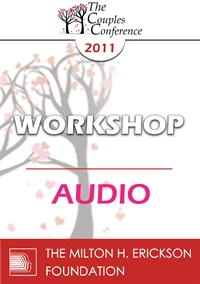
- Average Rating:
- Not yet rated
- Topic Areas:
- Workshops | Communication | Love | Couples Therapy | Family Systems
- Categories:
- Couples Conference | Couples Conference 2011
- Faculty:
- Richard Schwartz, PhD
- Duration:
- 1:57:57
- Format:
- Audio Only
- Original Program Date:
- Apr 02, 2011
- Short Description:
- This workshop is designed to help you and your partner learn how to achieve courageous love, based on the presenter’s Internal Family Systems model of psychotherapy. When couples have self-led conversations, their relationships harmonize naturally. They can discuss even highly charged issues productively and feel safe to reveal their most vulnerable parts to each other.
- Price:
- $15.00 - Base Price
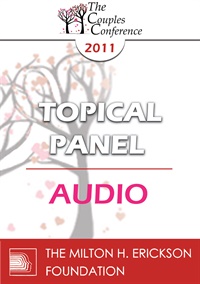
- Average Rating:
- Not yet rated
- Topic Areas:
- Topical Panels | Couples Therapy | Infidelity
- Categories:
- Couples Conference | Couples Conference 2011 | Pioneers in Couples and Family Therapy
- Faculty:
- Ellyn Bader, PhD | Marty Klein, PhD | Esther Perel, MA, LMFT | Jette Simon
- Duration:
- 56:56
- Format:
- Audio Only
- Original Program Date:
- Apr 02, 2011
- Short Description:
- A thought-provoking exploration of infidelity, examining its psychological roots, cultural contexts, and potential for relationship transformation. Experts delve into the complex motivations behind affairs, challenging traditional views on monogamy and offering nuanced insights into healing and growth after betrayal.
- Price:
- $15.00 - Base Price
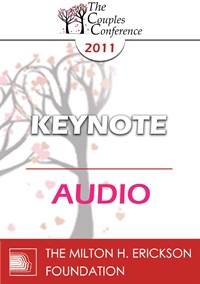
- Average Rating:
- Not yet rated
- Topic Areas:
- Keynotes | Neuroscience | Couples Therapy | Therapeutic Relationship
- Categories:
- Couples Conference | Couples Conference 2011
- Faculty:
- Daniel Amen, MD
- Duration:
- 2:12:44
- Format:
- Audio Only
- Original Program Date:
- Apr 01, 2011
- Short Description:
- This keynote explores how understanding individual brain types can transform treatment for mood, anxiety, and relationship challenges. Participants learn how neuroimaging reveals distinct patterns linked to impulsivity, rigidity, and emotional reactivity, and how tailored interventions—from exercise and nutrition to supplements and psychotherapy—can restore balance. The session offers a practical, brain-based approach to improving mental health, relationships, and overall well-being.
- Price:
- $15.00 - Base Price
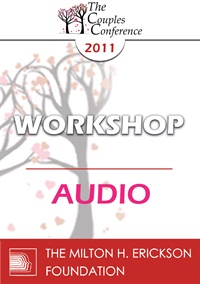
- Average Rating:
- Not yet rated
- Topic Areas:
- Workshops | Panic | Addiction | Pain and Healing | Sex and Sexuality | Couples Therapy
- Categories:
- Couples Conference | Couples Conference 2011
- Faculty:
- Marty Klein, PhD
- Duration:
- 1:56:37
- Format:
- Audio Only
- Original Program Date:
- Apr 01, 2011
- Short Description:
- This talk presents: 1) current information about porn, its users, and its impact on consumers and their relationships; 2) the common model of how porn use shapes sexual decision-making, and an alternative model that better matches people’s experiences; 3) an alternative to the “porn addiction” model for diagnosing and treating compulsive or impulsive behavior regarding porn.
- Price:
- $15.00 - Base Price
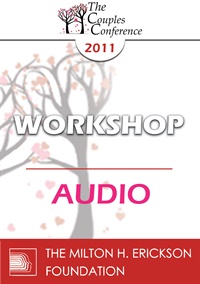
- Average Rating:
- Not yet rated
- Topic Areas:
- Infidelity | Workshops | Affairs | Couples Therapy | Intimacy | Relationships | Marriage | Multicultural
- Categories:
- Couples Conference | Couples Conference 2011
- Faculty:
- Esther Perel, MA, LMFT
- Duration:
- 1:30:32
- Format:
- Audio Only
- Original Program Date:
- Apr 01, 2011
- Short Description:
- Infidelity generally points out flaws in a relationship, and the revelation of an affair often triggers a crisis of trust and connection. We’ll examine the benefits and the costs of truth-telling and transparency, how couples can rebuild trust and intimacy, and how affairs can actually stabilize a marriage and prevent its dissolution. In particular, we will focus on how couples can turn the crisis into an opportunity. Combining didactic material, case studies and video vignettes, we will lay out a nuanced and multicultural therapeutic approach for working with extramarital relations, fantasized or real, disclosed or shrouded in secrecy.
- Price:
- $15.00 - Base Price
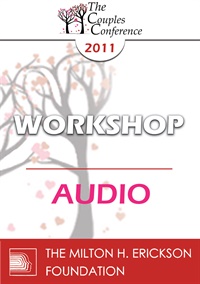
- Average Rating:
- Not yet rated
- Topic Areas:
- Couples Therapy | Workshops | Motivation | Neurobiology | Therapist Development
- Categories:
- Couples Conference | Couples Conference 2011
- Faculty:
- Jette Simon
- Duration:
- 1:41:46
- Format:
- Audio Only
- Original Program Date:
- Apr 01, 2011
- Short Description:
- Knowing how to elicit positive emotion even in couples steeped in intensely negative interactions is the key to providing the motivation for change. In this workshop, we’ll explore a variety of ways for creating “magical moments” in the therapy hour that offer a new template for couples, otherwise trapped in dysfunction, to allay repetitive cycles. You’ll learn how to use tools like focusing, sentence stems, doubling and directives to invite couples into new kinds of experience of connection. We’ll also examine the neurobiological principles that enable partners to expect and attract more positive experiences from each other.
- Price:
- $15.00 - Base Price
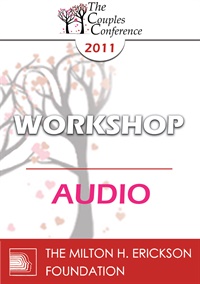
- Average Rating:
- Not yet rated
- Topic Areas:
- Couples Therapy | Post-Traumatic Stress Disorder (PTSD) | Trauma | Workshops | Sex and Sexuality | Gottman Method
- Categories:
- Couples Conference | Couples Conference 2011
- Faculty:
- Julie Gottman, PhD
- Duration:
- 1 Hour 42 Minutes
- Format:
- Audio Only
- Original Program Date:
- Apr 01, 2011
- Short Description:
- Couples therapy is often complicated and delicate when one partner has suffered childhood sexual abuse. The needs of both partners must be honored though one partner’s dream may be the other partner’s nightmare. This workshop describes the details of applying Gottman Method Couples Therapy to a case involving one partner’s history of severe sexual abuse.
- Price:
- $20.00 - Base Price
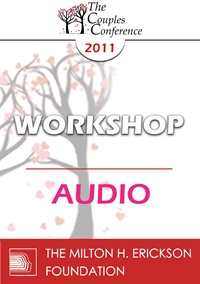
- Average Rating:
- Not yet rated
- Topic Areas:
- Attachment | Couples Therapy | Neuroscience | Workshops | Developmental Therapy Model | Differentiation
- Categories:
- Couples Conference | Couples Conference 2011 | Pioneers in Couples and Family Therapy
- Faculty:
- Ellyn Bader, PhD
- Duration:
- 1:12:19
- Format:
- Audio Only
- Original Program Date:
- Apr 01, 2011
- Short Description:
- A workshop exploring couples therapy through developmental, attachment, and neuroscience lenses. Learn to identify communication barriers, understand relationship stages, and help couples develop effective coping strategies. Includes practical tools, video demonstrations, and interactive exercises to enhance therapeutic interventions.
- Price:
- $15.00 - Base Price
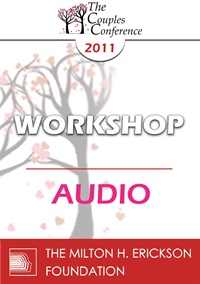
- Average Rating:
- Not yet rated
- Topic Areas:
- Workshops | Couples Therapy | IMAGO | Relationships | Mindfulness | Neurobiology
- Categories:
- Couples Conference | Couples Conference 2011
- Faculty:
- Jette Simon
- Duration:
- 1:33:01
- Format:
- Audio Only
- Original Program Date:
- Apr 01, 2011
- Short Description:
- Like walking a tightrope, working with couples in trouble requires focus and balance. Both partners want you to take their side, and, at times, it’s easy to get swallowed up by the intense emotionality of the sessions. So, how can you maintain a sense of balance and create an atmosphere in which healing can take place? In this workshop, you’ll learn how to use the principles of Imago Relationship Therapy to connect with the issues the couple brings to you and transform the emotional temperature of the session.
- Price:
- $15.00 - Base Price

